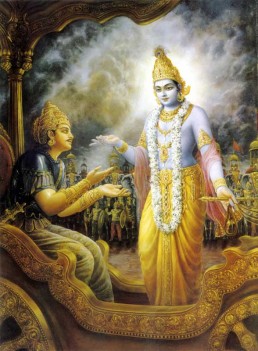Commentary
It is well known that every member of the society by and large always keeps himself busy through out his life time performing actions in his chosen field. A man of Self-realization also works in the world with the same enthusiasm and sincerity as an average man of the society with the difference that the actions of the ignorant are motivated by attachments and anxieties for the fruits of actions while the man of perfection will work without attachment and for the purpose of the welfare of the world at large.
Attachment becomes an obstruction only when it is ego-centric. But to the extent the attachment envelopes the welfare of a larger section of the community it gathers ethical value. Hence the advice to Arjuna is that he must fight as a warrior who is called upon to protect the higher values of living unattached to his ego-centric conception of himself and his people.
The idea is that an ignorant person acts zealously for his personal happiness; but a wise man should act, with the same zeal, for the welfare of others.
Swami Chinmayananda
Swami Chinmayananda Commentary
The commentary on this verse and the rest, is avaialble for free as:
Kindle eBook
Google Play Book
Apple Books
Adi Sankara Commentary
O scion of the Bharata dynasty, yatha, as; some avidvamsah, unenlightened people; kurvanti, act. saktah, with attachment; karmani, to work, (thinking) ‘The reward of this work will accrue to me’; tatha, so; should vidvan, the enlightened person, the knower of the Self; kuryat, act; asaktah, without attachment, remaining unattached. [Giving up the idea of agentship and the hankering for the rewards of actions to oneself.] Whay does he (the enlightened person) act like him (the former)? Listen to that: Cikirsuh, being desirous of achieving; lokasamgraham, prevention of people from going astray.
‘Neither for Me who am a knower of the Self, nor for any other (knower of the Self) who wants thus prevent people from going astray, is there any duty apart from working for the welfare of the world. Hence, the following advice is being given to such a knower of the Self:’
The Bhagavad Gita with the commentary of Sri Sankaracharya – Translated by Alladi Mahadeva Sastry
Holy Geeta – Commentary by Swami Chinmayananda
The Bhagavad Gita by Eknath Easwaran – Best selling translation of the Bhagavad Gita
The Bhagavad Gita – Translation and Commentary by Swami Sivananda
Bhagavad Gita – Translation and Commentary by Bhaktivedanta Swami Prabupadha
Srimad Bhagavad Gita Chapter 3 – Verse 25 – 3.25 saktah karmanya – All Bhagavad Gita (Geeta) Verses in Sanskrit, English, Transliteration, Word Meaning, Translation, Audio, Shankara Bhashya, Adi Sankaracharya Commentary and Links to Videos by Swami Chinmayananda and others – 25-Mar

